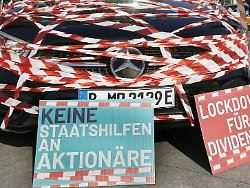Thursday, November 4th, 2021
DAX companies invest little
First the dividend, then climate protection
Germany’s large corporations are investing much less than would be necessary to become climate neutral in the coming decades. They have enough money to do so. However, companies prefer to distribute their profits rather than investing in the future, complain non-governmental organizations.
Instead of investing sufficiently in climate protection, according to a report, 30 Dax companies are distributing an increasing part of their profits to shareholders or building up financial reserves. As a report by Oxfam Germany and the citizens’ movement Finanzwende shows on Thursday, many DAX companies have the financial leeway for the investments that are required according to the EU to become climate-neutral by 2050.
The two organizations called for a corporate legal framework that ensures that corporations no longer put shareholder interests above the common good. The report analyzes how 30 DAX companies have used their profits in the past few years: between 2009 and 2020, dividends rose by 85 percent, almost twice as much as profits, which rose by 48 percent.
According to the report, individual companies (RWE, Eon and ThyssenKrupp) even transferred money to their shareholders in years of losses. In addition, the financial reserves have grown from 122 billion euros in 2014 to almost 200 billion at the end of 2020. According to the information, it is primarily shareholders who benefit from this, as larger reserves increase the value of the company.
Profits twice as high as investment gap
At the same time, according to the report, there was a lack of climate protection. Oxfam and Finanzwende calculated for each sector which investments the corporations would have to make annually in order to make their business models climate-neutral by 2050. According to the information, all companies invest too little, and many would be able to do so – without government subsidies or tax breaks.
In the transport sector, for example, the investment gap between BMW, Daimler, Volkswagen and Lufthansa amounts to 13.8 billion euros per year, according to the report, and their profits have recently been on average more than double. If the corporations were to make the necessary climate investments from this, they could on average still distribute at the level of the years 2009 and 2010, explained the authors.
